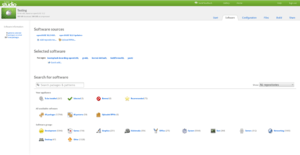SUSE Studio
|
The SUSE Studio page for editing an appliance | |
Type of site | Operating system build service |
|---|---|
| Owner | Novell Corporation |
| Slogan(s) | Your software, everywhere! |
| Website |
www |
| Alexa rank |
|
| Commercial | No |
| Registration | Optional (required to build and download appliances) |
| Current status | Online |
| Written in | HTML and Flash |
| IP address | 130.57.70.200 |
SUSE Studio is an online Linux software creation tool by SUSE. Users can develop their own Linux OS, software appliance or virtual appliance, mainly choosing which applications and packages they want on their "custom" Linux and how it looks.
Users can choose between openSUSE or SUSE Linux Enterprise as a base and pick from a variety of pre-configured images including jeOS, minimal server, GNOME and KDE desktops.
Image Formats and Booting Options
SUSE Studio supports the following image formats / booting options:
- Live CD/DVD / ISO image
- VMware image / VMDK
- VirtualBox
- Virtual Hard Disk[1]
- Hard disk / USB image
- Xen
- KVM
- OVF
- Amazon EC2 (AMI)
- PXEBoot (Onsite version only)
SUSE Studio in use
On SUSE Gallery one can find a catalog of the images created in SUSE Studio. These are available for download as well as immediate deployment on the supported cloud platforms. Upon logging in, cloning and test-driving images is possible.
A number of projects, both related to the openSUSE Project[2] and independent,[3] use SUSE Gallery as the preferred way to get virtual- and Disk images to their users.
SUSE Studio is what powered the fan-made Chrome OS, which was a semi-stripped-down system loaded with the developers' version of Google Chrome, Google web application links, and OpenOffice.org (not to be confused with Google's "Chrome OS").[4]
The many desktop environments supported (not limited to):
JeOS
LXDE
KDE
GNOME
XFCE
Server(textbased)
MATE
Enlightenment
See also
References
- ↑ Hyper-V appliances are GO!, SUSE Studio, February 6, 2012
- ↑ openSUSE Medical uses Studio as main outlet
- ↑ Browserbox uses Studio as main outlet, archived from the original on 2010-09-14
- ↑ Use SuSE Studio to Build a Linux OS from Scratch, LifeHacker, September 29, 2009, retrieved 2011-01-07
